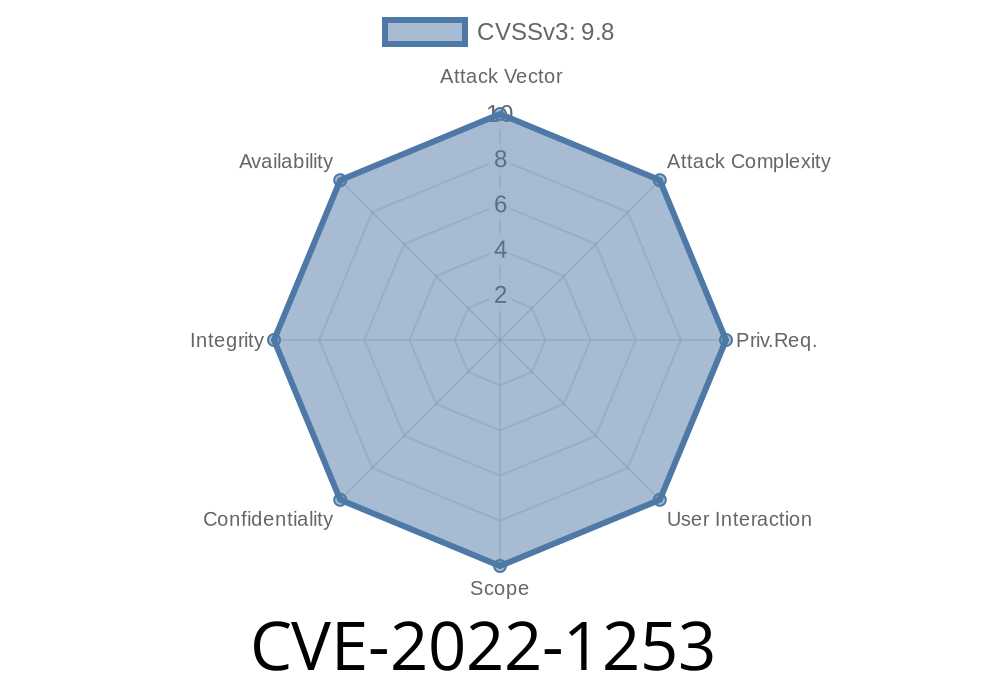A serious security flaw known as CVE-2022-1253 was found in the strukturag/libde265, an open-source library for decoding H.265/HEVC video streams. This vulnerability affects all versions up to and including 1..8 and allows attackers to trigger a heap-based buffer overflow, which can be exploited to execute arbitrary code or crash applications using this library.
The issue was patched in commit 8e89fee175d287c39486fdd09250b230ec10b8, but no stable release has incorporated the fix yet. This post walks you through what happened, how it can be abused, and how to stay safe.
What is libde265?
libde265 is a widely used decoder for H.265 video streams. Many apps and video tools depend on it for handling modern video files. If it's vulnerable, every app using it may be at risk.
What’s a Heap-based Buffer Overflow?
It means the software writes more data than it should into a region (buffer) allocated on the program’s heap. This can overwrite adjacent data or code–letting attackers:
What caused it?
In certain cases, the library failed to check if buffers were large enough to store incoming data. Malicious video files could then "overflow" and overwrite memory.
Before the Fix
// Example logic from old code
uint8_t* buffer = (uint8_t*)malloc(size_needed);
// ...no proper check on buffer size...
memcpy(buffer, incoming_data, untrusted_length); // may overflow if untrusted_length > size_needed
Vulnerable Point:
If untrusted_length > size_needed, the program writes past the end of the allocated buffer.
After the Fix (Commit 8e89fee175d287c39486fdd09250b230ec10b8):
// Patched logic
if(untrusted_length <= size_needed) {
memcpy(buffer, incoming_data, untrusted_length);
} else {
// handle error safely
}
Could This Be Exploited in the Wild?
Yes. To exploit this, an attacker creates a malicious video stream/file that tricks libde265 into reading more bytes than expected. Video players, conversion tools, or server-side scripts using vulnerable libde265 can then be targeted.
- Attack vectors: Opening a crafted malicious HEVC video file, or web exploits where user-provided video is parsed server-side.
- Payloads: Anything from program crash (denial-of-service) to remote code execution if code pointers are overwritten carefully.
Example Attack Flow
1. Attacker creates a poisonous .HEVC video file with oversized fields.
2. Target app loads the video, triggering the vulnerable code path.
3. Program buffer is overrun on the heap–attacker overwrites key data.
4. Possible next steps:
- Crash the app (DoS)
- Control instruction pointer (arbitrary code)
- Escalate privilege, steal data, etc.
Proof-of-Concept (PoC): Triggering a Crash
*The following PoC demonstrates a crash (DoS). DO NOT USE THIS MALICIOUSLY!*
// Pseudocode: Do not use maliciously!
// Assume 'malicious_video.hevc' has crafted buffer overrun.
#include <libde265/de265.h>
#include <stdio.h>
int main() {
de265_decoder_context* ctx = de265_new_decoder();
FILE* f = fopen("malicious_video.hevc", "rb");
uint8_t buf[1024];
int readsize;
while ((readsize = fread(buf, 1, 1024, f)) > ) {
de265_push_NAL(ctx, buf, readsize, , , NULL);
}
// reading/decoding triggers the crash
de265_free_decoder(ctx);
fclose(f);
return ;
}
With a special malicious_video.hevc, this will crash libde265 before the patch.
Mitigation and Fix
- The fix: Commit 8e89fee175d287c39486fdd09250b230ec10b8
Clone the repo and build from the latest commit after 8e89fee1.
- Replace your libde265 with your custom/patched build.
`bash
git clone https://github.com/strukturag/libde265.git
git checkout 8e89fee175d287c39486fdd09250b230ec10b8
./autogen.sh
./configure
References and Further Reading
- Official CVE Record (CVE-2022-1253)
- libde265 GitHub Repository
- Security Patch Diff
- Debian Security Advisory
- Red Hat Security Advisory
Conclusion
CVE-2022-1253 is a critical heap-based buffer overflow in libde265, endangering any software using it for HEVC decoding. The bug is easy to exploit with a malicious video and may lead to major security issues.
Patch immediately by building from the latest commit or monitor for upcoming official releases containing the fix. If you're a developer or sysadmin–review every project that relies on libde265, and coordinate security updates as soon as possible.
Timeline
Published on: 04/06/2022 12:15:00 UTC
Last modified on: 04/14/2022 17:52:00 UTC
